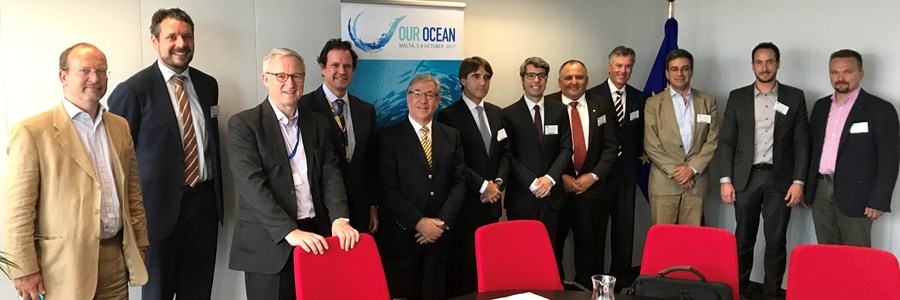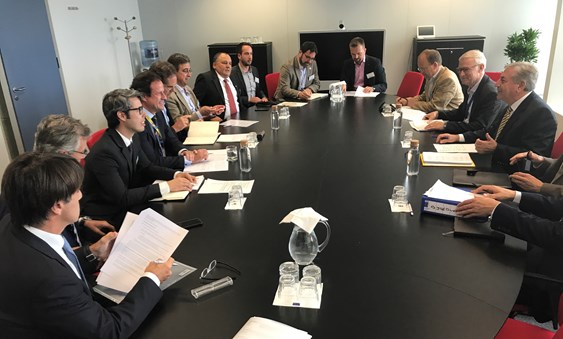El Comisario Vella se comprometió a apoyar la flota pesquera de larga distancia de la UE

Sr. Karmenu Vella, Comisario de Medio Ambiente, Asuntos Marítimos y Pesca, se reunió ayer con una delegación de Europêche que representa a la flota pesquera de larga distancia en Europa. Tanto el Comisario Vella como Europêche valoraron positivamente las principales mejoras introducidas en la dimensión exterior de la Política Pesquera Común (PPC), que sitúa a las flotas pesqueras de aguas alejadas de la UE en la vanguardia de la pesca sostenible en el mundo. El sector recordó la importancia de adoptar más acuerdos de pesca con terceros países que deban vincularse a las políticas comerciales y regionales. Europêche solicitó mayor presión diplomática a Noruega sobre la cuestión de la pesca de cangrejos de nieve y otras poblaciones importantes de peces en las aguas de Barents y Svalbard.
Both Commissioner Vella and Europêche members agreed that sustainable fisheries partnership agreements (SFPAs) are the most transparent and mutually beneficial fisheries agreements in the world. For this purpose, the sector requested diplomatic support at the highest level to renew the agreement with Guinea-Bissau on fair terms. Europêche also asked the Commissioner to make every effort to renew the agreements with Morocco and Gabon.
The fishing body also called for the reactivation of the so-called "dormant agreements"[1], such as Gambia and Equatorial Guinea. These agreements have not been operational for more than 20 years and, due to the exclusivity clause, are paradoxically not only preventing EU companies to fish in these waters but also to conclude other private agreements.
The EU fishing sector stressed the need to establish a coherent network of SFPAs to secure fishing access to highly-migratory species as well as to link these agreements’ negotiations to regional management policies. The latter would help strengthening sustainable governance in all oceans.

Regarding the new Regulation on the sustainable management of external fishing fleets, which is expected to enter into force in early 2018, Europêche has asked Vella for support in order to comply with the new requirement to provide a scientific evaluation demonstrating the surplus of resources in third country’s waters where private agreements exist. In particular, Europêche requested to help African countries to build the capacity to carry out the necessary scientific stocks assessments.
Europêche members also reiterated their support for EU policies and actions in the fight against IUU fishing. In line with the Long Distance Advisory Council advice, Europêche requested the mandatory inclusion of the IMO number in the catch certificates for imports of fisheries products for third country’s fleets to guarantee an international level playing field and combat fraud. The sector encouraged the European Commission (EC) to adapt market access rules according to the standards adopted for the EU fleet.
With regard to bluefin tuna, Europêche hopes that the ICCAT Scientific Committee will finally recognise the full recovery of the species and that the EC can defend a substantial increase in the Total Allowable Catches (TAC) at the meeting in November.
Europêche also stressed the importance of relations between the EU and Norway, however recalled the importance of defending the rights of Member States in Svalbard. The situation stills remains unbalanced and overly favourable to Norway to the detriment of the EU fishing fleet, not only on issue of snow crab, but also related to other important fish stocks such as Greenland halibut, redfish and haddock.
Ahead of the upcoming Our Ocean Conference on Malta, 5-6 October 2017, Europêche discussed possible industry commitments to actively involve fishing vessels in litter collection schemes.
Javier Garat, President of Europêche, declared: ‘The maintenance of current SFPAs and the search for new fishing opportunities in non EU-waters must be a priority objective of the EU external fishing policy. When the EU fleet ceases to operate in the fisheries of a third country, such fishing opportunities are reallocated to other fleets that have much lower standards of conservation, management and sustainability than those advocated and defended by the EU. The long-distance fleets will continue playing a leading role in providing food security, since they catch around 28% of the EU’s total catch for human consumption.’
Ends
Europêche represents the fisheries sector in Europe. Currently, the Association comprises 15 national organisations of fishing enterprises from the following 10 EU Member States: DE, DK, ES, FR, IT, MT, NL, LV, PL, UK.
Press contacts:
Daniel Voces, Acting Managing Director of Europêche: +32.2.230.48.48 daniel.voces@europeche.org
[1] "Dormant agreements" refer to countries who adopted a SFPA without having an implementing Protocol into force.
Sources: Europeche
Tags: Comisario Vella, SFPA, RFMO, flota de larga distancia, iccat, TAC, dg mare, acuerdos inactivos, Noruega